第4章 冠词
冠词用法及口诀
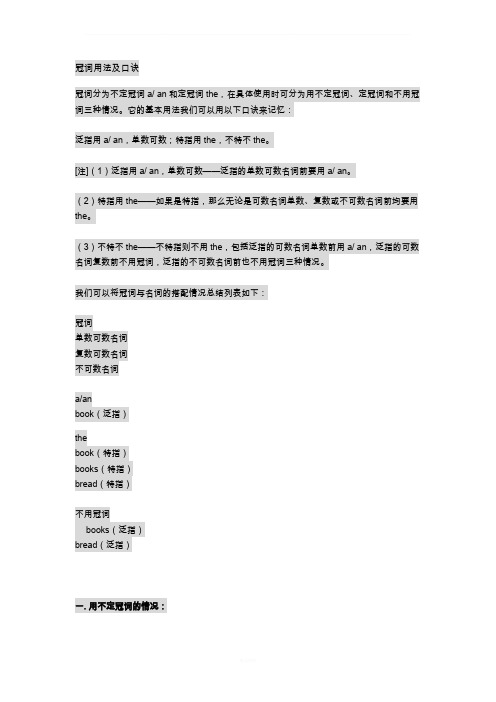
冠词用法及口诀冠词分为不定冠词a/ an和定冠词the,在具体使用时可分为用不定冠词、定冠词和不用冠词三种情况。
它的基本用法我们可以用以下口诀来记忆:泛指用a/ an,单数可数;特指用the,不特不the。
[注](1)泛指用a/ an,单数可数——泛指的单数可数名词前要用a/ an。
(2)特指用the——如果是特指,那么无论是可数名词单数、复数或不可数名词前均要用the。
(3)不特不the——不特指则不用the,包括泛指的可数名词单数前用a/ an,泛指的可数名词复数前不用冠词,泛指的不可数名词前也不用冠词三种情况。
我们可以将冠词与名词的搭配情况总结列表如下:冠词单数可数名词复数可数名词不可数名词a/anbook(泛指)thebook(特指)books(特指)bread(特指)不用冠词books(泛指)bread(泛指)一. 用不定冠词的情况:单数可数名词前用到不定冠词a/ an时,一定要根据它后面单词的首音素来判断。
a接以辅音音素开头的单词或字母,an接以元音音素开头的单词或字母。
如:a book, a Japanese car, an egg, an hour(h不发音),an“s”(字母s的首音素为[e]),a“u”(字母u的首音素为[j])二. 用定冠词的情况:定冠词the的用法很多,也较复杂,因此同学们常常出错。
其实the的用法可以用以下口诀来记忆和理解:特指双熟悉,上文已提及,世上独一无二,序数最高级,某些专有名,习语及乐器。
[注](1)the用在“特指”谈话双方都知道的某个人或某些人或物前。
如:Where is the teacher?老师在哪里?(2)the用在上文已提到的人或事物前。
如:I can see a cat. The cat is Lucy”s.我能看见一只猫,那只猫是露茜的。
(3)the用在世界上独一无二的事物前。
如:The earth goes around the sun.地球围绕着太阳转。
2024版小学冠词

01
02
03
冠词混淆
小学生常常混淆“a”和 “an”的用法,不清楚何 时使用哪个冠词。
2024/1/30
冠词缺失
在应该使用冠词的地方遗 漏了冠词,导致句子不完 整或不准确。
冠词多余
在不需要使用冠词的地方 误加了冠词,造成句子冗 余或语法错误。
24
纠正方法和策略分享
明确规则
教授学生明确的冠词使用规则, 例如“a”用于以辅音音素开头的 单词,“an”用于以元音音素开
2024/1/30
7
发音规则
2024/1/30
01
不定冠词a用于辅音音素前,一般 读作/eɪ/。
02
不定冠词an用于元音音素前,一般 读作/æn/或/ən/。
8
使用注意事项
不定冠词a/an表示 “一个”,用于修饰 可数名词单数,表示 泛指。
不定冠词a/an没有复 数形式,不能与可数 名词的复数形式连用。
2024/1/30
13
用于某些固定短语中
2024/1/30
用于某些习惯用语和固定短语中,例如
01
in the morning(在早上),on the other hand(另一方面)
用于表示乐器名称前,例如
02
play the piano(弹钢琴)
用于表示度量衡单位前,例如源自03by the pound(按磅计算)
21
举例说明其在句子中作用
“我有一个苹果。”中的“一 个”是冠词,用来表示苹果的 数量。
2024/1/30
“所有的学生都来了。”中的 “所有”是冠词,用来表示学 生的范围。
“这本书很有趣。”中的“这” 是冠词,用来指示特定的书。
22
第四章词语的翻译

* 大多数地名。 例如: Australia 澳大利亚 New York 纽约 Atlanta 亚特兰大 Miami 迈阿密 * 译入语原来没有的事物,包括科技新词、某 些商标与文化词等 。例如: Dink 丁克 Hippie 嬉皮士 Sauna 桑拿 Shock 休克 Logic jeep sofa tank Pie biscuits
The day was bright, with a fresh breeze blowing. • (三)关联词连词的增减。由于英语的词 与词,句与句之间强调形式连接,因此连 词种类繁多,使用广泛。而汉语的句子结 构注重关系和逻辑顺序,因此对语序固定, 关系自明的短语或句子,就减少了很多连 接词的使用。故英译汉,多减少而汉译英 多增加关联词和连词的使用。 例如:
第四章章词词语的翻译译语义来自上下文文?民间性经济文化关系民间组织?nongovernmental?民间传说popular?民间工艺folk?在中国人心中inthemindsof?心甘情愿bemostwillingto?心明眼亮besharpeyedandclearminded?心连心heartlinkedtoheart?心里话onesinnermostthoughtsandfeelings?祖国统一reunification?卫生局publichealthbureau?卫生设备sanitaryequipment?卫生标准hygienicstandard?卫生纸toiletpaper?卫生球camphorball?开门openthedoor开车driveacar?开会holdameeting开灯turnonalight?开业startabusiness开支票writeacheck?开玩笑playajoke开夜车worklateintothenight?词语翻译的基本技巧
Unit4语法冠词讲义牛津译林版英语七年级上册
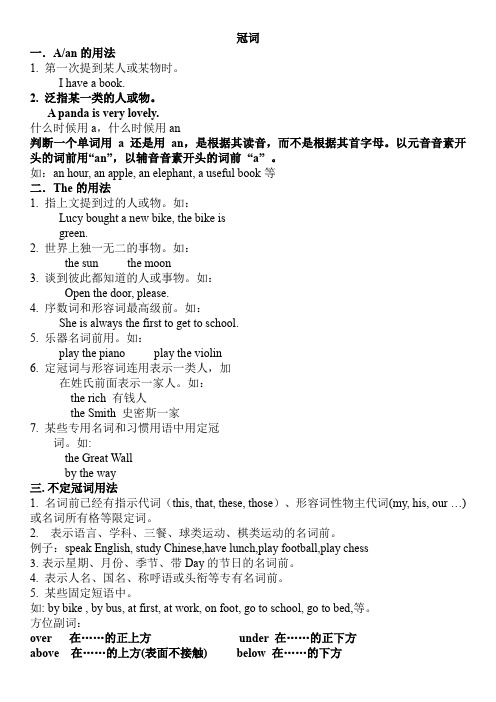
冠词一.A/an的用法1. 第一次提到某人或某物时。
I have a book.2. 泛指某一类的人或物。
A panda is very lovely.什么时候用a,什么时候用an判断一个单词用 a 还是用an,是根据其读音,而不是根据其首字母。
以元音音素开头的词前用“an”,以辅音音素开头的词前“a” 。
如:an hour, an apple, an elephant, a useful book等二.The的用法1. 指上文提到过的人或物。
如:Lucy bought a new bike, the bike isgreen.2. 世界上独一无二的事物。
如:the sun the moon3. 谈到彼此都知道的人或事物。
如:Open the door, please.4. 序数词和形容词最高级前。
如:She is always the first to get to school.5. 乐器名词前用。
如:play the piano play the violin6. 定冠词与形容词连用表示一类人,加在姓氏前面表示一家人。
如:the rich 有钱人the Smith 史密斯一家7. 某些专用名词和习惯用语中用定冠词。
如:the Great Wallby the way三.不定冠词用法1. 名词前已经有指示代词(this, that, these, those)、形容词性物主代词(my, his, our …)或名词所有格等限定词。
2. 表示语言、学科、三餐、球类运动、棋类运动的名词前。
例子:speak English, study Chinese,have lunch,play football,play chess3.表示星期、月份、季节、带Day的节日的名词前。
4. 表示人名、国名、称呼语或头衔等专有名词前。
5. 某些固定短语中。
如: by bike , by bus, at first, at work, on foot, go to school, go to bed,等。
初中英语语法讲解第四章代词(一)

初中英语语法讲解第四章代词(Pronouns)代词:是代替名词以及起名词作用的短语、动词不定式、V-ing 形式、从句或句子的词。
一.代词的分类英语中代词分为九类:人称代词、物主代词、反身代词、指示代词、相互代词、疑问代词、不定代词、关系代词和连接代词。
分类及及例词如下:人称代词 I we you he she it them物主代词 my your his her our their mime hers theirs ouss 反身代词 myself yourself ourselves itself themselves指示代词 this that these those相互代词 each other one another疑问代词 who whom whose which what不定代词 all some any much many few little关系代词 who whom whose that which as连接代词who whom whose which what二、人称代词(主要用来指人的代词,也可指物)1、人称代词的形式人称代词有主格和宾格,有单复数形式2、人称代词的句法功能人称代词有主格和宾格之分,主格形式在句中作主语、表语等成分,宾格形式在句中作动词宾语、介词宾语、同位语等。
巧记:主格、宾格姐妹俩,人称代词是一家;宾格负责迎“宾”客,主格作“主”来当家。
⑴人称代词主格的句法功能①作主语 e.g. I’m a student. You are a teacher. We all work very hard.②作表语,用在“It’… who(that)…”结构中 e.g. It’s she who has been wrong.⑵人称代词宾格的句法功能①作及物动词的宾语 e.g. Tell him\her to call back a little later.②作介词宾语 e.g. This pen is bad. I can’t write with it.I believe in you .③作同位语 we , us three will be able to finish the work .④作表语人称代词作表语时,通常要用宾格e.g. —Who is knocking at the door? —It’s me.3、使用人称代词需注意的几点①主格I 在句中的任何位置都必须大写Mum suggests that I should cheer up when meeting with failure .②在英语中如果出现多个人称代词,单数并列为you ,he/she and I 或you ,him/herand me ; 复数并列为we ,you and they 或 us ,you and them . 如果需承担责任,说话者则把第一人称放在第一位。
第4章-冠词
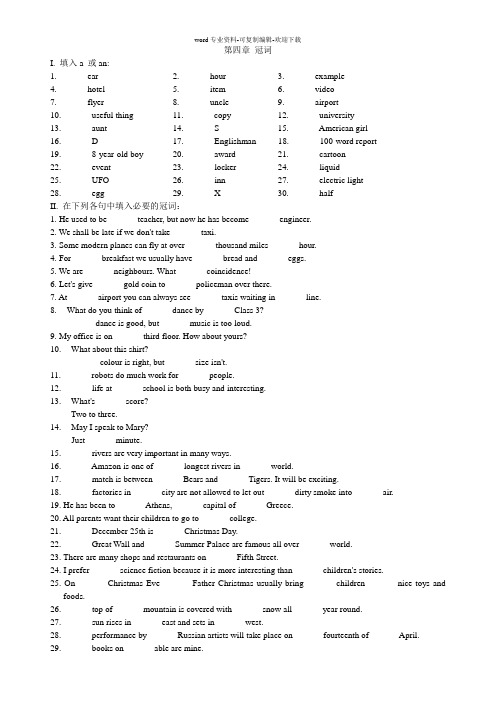
第四章冠词I. 填入a 或an:1. ______ ear2. ______ hour3. ______ example4. ______ hotel5. ______ item6. ______ video7. ______ flyer 8. ______ uncle 9. ______ airport10. ______ useful thing 11. ______ copy 12. ______ university13. ______ aunt 14. ______ S 15. ______ American girl16. ______ D 17. ______ Englishman 18. ______ 100-word report19. ______ 8-year-old boy 20. ______ award 21. ______ cartoon22. ______ event 23. ______ locker 24. ______ liquid25. ______ UFO 26. ______ inn 27. ______ electric light28. ______ egg 29. ______ X 30. ______ halfII. 在下列各句中填入必要的冠词:1. He used to be ______ teacher, but now he has become ______ engineer.2. We shall be late if we don't take ______ taxi.3. Some modern planes can fly at over ______ thousand miles ______ hour.4. For ______ breakfast we usually have ______ bread and ______ eggs.5. We are ______ neighbours. What ______ coincidence!6. Let's give ______ gold coin to ______ policeman over there.7. At ______ airport you can always see ______ taxis waiting in ______ line.8. -- What do you think of ______ dance by ______ Class 3?-- ______ dance is good, but ______ music is too loud.9. My office is on ______ third floor. How about yours?10. -- What about this shirt?-- ______ colour is right, but ______ size isn't.11. ______ robots do much work for ______ people.12. ______ life at ______ school is both busy and interesting.13. -- What's ______ score?-- Two to three.14. -- May I speak to Mary?-- Just ______ minute.15. ______ rivers are very important in many ways.16. ______ Amazon is one of ______ longest rivers in ______ world.17. ______ match is between ______ Bears and ______ Tigers. It will be exciting.18. ______ factories in ______ city are not allowed to let out ______ dirty smoke into ______ air.19. He has been to ______ Athens, ______ capital of ______ Greece.20. All parents want their children to go to ______ college.21. ______ December 25th is ______ Christmas Day.22. ______ Great Wall and ______ Summer Palace are famous all over ______ world.23. There are many shops and restaurants on ______ Fifth Street.24. I prefer ______ science fiction because it is more interesting than ______ children's stories.25. On ______ Christmas Eve ______ Father Christmas usually bring ______ children ______ nice toys andfoods.26. ______ top of ______ mountain is covered with ______ snow all ______ year round.27. ______ sun rises in ______ east and sets in ______ west.28. ______ performance by ______ Russian artists will take place on ______ fourteenth of ______ April.29. ______ books on ______ able are mine.30. ______ boys, come to ______ dinner with me.31. ______ student over there is ______ best in ______ class at ______ English.32. My brother likes playing ______ tennis and I like playing ______ piano.33. Perhaps this is ______ shortest way to ______ Science Museum.34. I have two children: ______ boy and ______ girl. ______ boy's name is John, and ______ girl's name isMary.35. Excuse me, is this ______ train for ______ London?36. ______ flowers in ______ garden smell nice.37. Bob and I sit at ______ same desk.38. When I got there, ______ last bus had gone, so I had to go home on ______ foot.39. He is going to London by ______ air, but I'd prefer to go there on ______ train.40. ______ spring has come, and ______ leaves are turning green again.41. After ______ lunch we usually have half ______ hour's rest.42. Nobody wanted to be ______ first to speak, so the teacher asked, "Who'll break ______ ice?"43. ______ morning is ______ best time for ______ work.44. When I learned my aunt was in ______ hospital, I went to see her.45. Please call in fifteen minutes. He's busy at ______ moment.46. Ming Ming was chosen to go to ______ South Pole as ______ Young Pioneer.47. Some shops are still open even late at ______ night.48. ______ East China Sea is part of ______ Pacific.49. Where is ______ letter from ______ Jane?50. I'd like to send ______ parcel to ______ New Zealand by ______ ordinary mail.III. 选择填空1. -- May I open ______ bag, sir.'?-- Of course, but it's full of ______ dirty clothes.A. the, /B. the, theC. /, /D. a, /2. ______ family often eat ______ supper together.A. /, /B. The, theC. The, /D. A, a3. ______ mice are often found in ______ dirty houses.A. The, theB. The, /C. /, any ofD. /, /4. My father never lets us go to ______ movies ourselves.A. /B. aC. theD. some of5. -- Have you ever been to ______ Netherlands?-- No, but I have been to ______ France.A. the, theB. /, /C. /, theD. the, /6. As there is no bridge over the river, people have to cross it ______.A. in boatB. on the boatC. by a boatD. by boat7. ______ girl at ______ checkout was too busy to answer my question.A. The, theB. A, theC. The, aD. A, a8. -- Hello, is Betty there?-- I'm sorry, you've got ______ wrong number.A. aB. theC. /D. some9. Peter always came home from ______ school very late, so his mother went to ______ school to find out.A. /, /B. the, theC. the, /D. /, the10. Sam sold ______ pictures every day, and all ______ pictures in his shop were cheap.A. /, theB. /, /C. the, /D. the, the11. ______ enjoy watching ______ Mickey Mouse on TV.A. Most children, /B. The most children, theC. Most children, theD. Most of children, /12. Many rivers in our country run from ______ west to ______ east.A. the, theB. /, /C. the, /D. /, the13. -- What's ______ postage for ______ parcel, sir.'?-- I'll weigh it first.A. a, theB. a, aC. the, theD. the, a14. ______ dictionary is ______ useful book.A. A, aB. The, anC. The, theD. A, the15. He collects Chinese paintings for ______ hobbies, but not for ______ money.A. /, /B. the, theC. the, /D. /, the16. You can't keep this book for more than two weeks. This is ______ only copy in our library.A. theB. /C. anD. a17. -- Don't make any noise, ______ children. Your father is at ______ work.-- OK.A. /, theB. /, /C. the, /D. the, the18. It's very warm today. ______ warm day is almost like ______ early summer.A. A, theB. The, /C. /, theD. A, a19. He is a student of ______ history, and he studies ______ history of Canada.A. the, theB. the, /C. /, /D. /, the20. Which language do you speak better, ______ English or ______ Japanese?A. the, theB. the, / C, /, the D. /, /21. I prefer going by ______ sea to going in ______ train.A. /, /B. /, theC. /, aD. the, a22. ______ Oxford Street is one of ______ busiest streets in London.A. /, /B. /, theC. The, theD. The, /23. He is usually at ______ home on ______ weekends.A. /, /B. /, theC. the, /D. the, the24. One of Harry's feet was bigger than ______ other, so he could never find ______ shoes for his feet.A. the, theB. the, /C. /, /D. /, the25. It's ______ very long way from our world to ______ moon.A. a, theB. the, aC. the, theD. a, /26. We have ______ computer room in our school, and we are going to build ______ second one.A. a, theB. the, theC. a, aD. the, a27. He telephoned his wife to tell her ______ name and address of ______ hotel.A. the, aB. /, /C. the, theD. /, the28. When it began to rain, we ran to find ______ place to hide from ______ rain.A. a, theB. the, aC. a, /D. the, /29. He found he couldn't sleep at ______ night, so he kept on falling asleep during ______ day.A. /, /B. the, /C. the, aD. /, the30. It's pleasant to travel along ______ Nile on ______ ship.A. /, theB. the, /C. the, aD. /, a31. -- Here are many kinds of pens. Have you found ______ one that you want?-- Yes.A. theB. aC. /D. some32. -- Have you got any cheaper walkmans?-- Yes ______ walkman beside ______ black one are cheaper.A. The, /B. The, theC. /, aD. /, /33. -- What about brown ones?-- Well, they are just ______ size I want. How much do they cost?A. aB. /C. theD. any34. She enjoys ______ school, but some of ______ work is too easy for her to feel interested.A. /, /B. the, /C. /, theD. the, the35. Some people read ______ newspapers as ______ first thing to do in the morning.A. the, theB. /, aC. /, theD. the, /36. ______ Browns go to ______ church every Sunday morning.A. The, /B. /, /C. /, aD. A, the37. Be sure to close ______ windows before you leave ______ room.A. /, /B. /, theC. the, theD. the, a38. Bruce plays ______ video games as soon as he's got free time during ______ day.A. /, aB. the, theC. the, aD. /, the39. ______ Yellow River is one of ______ famous rivers in the world.A. The, theB. /, theC. The, /D. /, /40. He will leave for ______ America after ______ Christmas.A. /, /B. the, theC. /, theD. the, /41. ______ Chinese is one of ______ most beautiful languages in the world.A. The, theB. /, theC. the, /D. /, /42. John noticed ______ books on ______ sale and bought a few of them.A. /, /B. the, theC. the, aD. the, /43. The lady said sorry to me as she spilled some of ______ coffee on ______ floor.A. the, theB. /, aC. the, aD./, /44. Usually ______ children begin to take an interest in reading around ______ age of five.A. /, theB. the, theC. /, anD. the, an45. ______ Maxim's in ______ Paris is a very famous restaurant in the world.A. The, theB. /, /C. /, theD. A, /46. ______ policemen in England, unlike those in the United States, do not carry ______ guns.A. The, theB. /, /C. /, theD. The, /47. ______ mathematics is ______ difficult course for people to understand.A. The, aB. /, theC. /, aD. /, /48. Matha, aunt is coming for ______ visit in ______ April.A. the, theB. a, /C. a, /D. the, /49. The basket of ______ apples was sent as ______ Christmas present.A. the, theB. /, theC. /, aD. /, /50. ______ Professor Lee hasn't come back yet; he's still in ______ hospital.A. /, /B. The, aC. The, /D. A, a。
六年级下英语试题-2019小升初总复习 第4章词汇 专题3代词+专题4 冠词

六年级下英语试题-2019小升初总复习专题三代词一、按要求写单词。
1.we(形容词性物主代词)_ _ 2.his(宾格)__ __3.her(主格)__ __ 4.it(形容词性物主代词)__ __ 5.my(名词性物主代词)__ __ 6.these(单数)__ __7.that(复数)__ __ 8.he(复数)_ __9.us(名词性物主代词)__ __ 10.himself(复数)__ __二、选出每组单词中不同类的一项。
()1.A.she B.it C.he D.your()2.A.my B.he C.her D.its()3.A.ours B.mine C.yours D.it()4.A.them B.their C.me D.it()5.A.his B.its C.you D.my三、看图,选词填空。
1.Look!_ __ is my sister.__ __ name is Lisa.(Her,She)2.—Do you have __ __ pingpong balls?—Yes,I have __ __.(some,any)3.—__ __ pencil box is this?—It's Tom's.(Who,Whose)4.These erasers aren't __ _.Look,__ _ eraser is there.(my,mine)5.This is __ __ family photo and __ __ are my parents.I am __ _ son.(their,my,they)四、单项选择。
()1.I often help ______ with their homework.A.they B.them C.their()2.There are many teachers in ______ school.A.we B.us C.our()3.Tom and Jack are brothers.This room is ______.A.they B.them C.theirs()4.I have a big brother.______ name is Paul.A.His B.Her C.He()5.—Are Sandy and Kate ______ good friends?—Yes,they are.Please look after ______.A.your;their B.your;them C.yours;theirs五、选词填空。
英语语言学笔记第四章

句法(syntax)这个单词,来自希腊语,由两个语素构成:﹛syn﹜和﹛tax﹜。
﹛syn﹜的意思是"一起、共同",﹛tax﹜的意思是"安排、排列",因此syntax本来是"排列在一起"或"组合"的意思。
在语言学上,它是指研究语言中词组合成句子的支配规则,或者简单地说,是研究句子的构造。
因为通常认为句子是语言中最大的语法单位,所以句法长期以来是语法研究的核心。
不同的语言学理论首先体现在对句子结构的不同处理上。
这一章我们将介绍一些有代表性的句法学派。
4.1 传统学派传统认为句子是词的序列。
因此句子构造的研究涉及了对词的大量研究,例如,词类是对词进行的分类,主语、谓语是对词功能的描写,等等。
这些词类和功能有时叫做范畴。
但是"范畴"这个术语,更专门用于表示像名词、动词这些单位的特性。
例如:常说名词有数、性、格的范畴,动词有时、体、态的范畴。
在这里,我们将简要地讨论以上一些范畴。
名词、动词、形容词等形式在有关范畴中的相互关系将在"一致关系和支配关系"中讨论。
4.1.1 数、性、格4.1.2 时和体4.1.3 一致关系和支配关系4.1.1 数、性、格数(number),主要是名词和代词的范畴,如:a book(一本书);some books(一些书);I(我),we(我们);he(他),they(他们)。
英语动词也反映了数的范畴,如:He speaks English.(他说英语);They speak English.(他们说英语)。
在法语等语言中,形容词和冠词也有数的变化,如:le cheval royal,les chevaux royaux。
数一般有两种:单数和复数。
但是在古希腊语、阿拉伯语等语言中,还有第三种数:双数,类似于英语中的both(双方,两者)。
斐济群岛语还有第四种数:三数。
语言学概论(第四版)PPT第4章 词汇

二、词汇的分类
1. 语言的词汇,是指一种语言中全部词和固定词语的总和,如汉语词汇就是指汉语中全部 词和固定词语的总和,英语词汇则是指英语中全部词和固定词语的总和。
2. 言语的词汇是指个人运用语言的词汇,它是允许存在偏离语言规范、不同于语言词汇之 处的。
一、语言词汇的性质和特点
(一)语言词汇的性质 1. 充当语言的建筑材料是语言词汇的基本属性。 2. 词汇的各种单位必须在语言的结构规律———语法规律支配下,有目的地组织排列起来,
一、语言词汇的性质和特点
(二)语言词汇的特点 4. 词汇的变化性与稳定性
• 社会生活的发展变化,都会很快地反映到词汇中。这就使得一些旧词语逐渐从人们 口中消失,而很多新词语又不断在交际以及传播媒体中出现,这就是词汇的变化性。
• 同时,词汇的变化并不是随心所欲的,它要受到词汇系统的影响和严格制约,有着 极强的稳定性。
• 方言词:广义的方言词指各方言区的方言词汇;狭义的方言词则是指那些本来在方言 地区通行,但进入了共同语,并被全社会接受和比较广泛使用的词。
五、词语系统
(一)词汇系统 4. 从来源上看,可以形成以下词聚。
• 外来词:外来词也叫借词,即从外族语言中连音带义借用来的词,外来词不包括意译 词,意译词是根据原词的意义,根据本族语言的词汇材料和构词方式创造的新词。
三、词
(二)词的构成成分———语素 1. 语素的定义:语素是语言中最小的不能独立运用的音义结合单位 2. 语素的分类
• 根据语素能否独立运用,可以把语素分为成词语素和不成词语素。 成词语素是指可以直接成为词,即可以独立使用的语素;不成词语素则是指不能单 独成词,即不能独立使用的语素
三、词
(二)词的构成成分———语素 2. 语素的分类
张道真实用英语语法学习笔记第四章冠词

第4章冠词4 . 1 . 1定冠词和不定冠词冠词是一种虚词,不能独立担任一个成分,只能附着在一个名词上,帮助说明其词义,英语中有两个冠词:1) 定冠词(The Definite Article) 即 the;2) 不定冠词(The Indefinite Article) 即 a和 an。
the通常读作/ds/,在元音前读作/di/,特别强调或单念时读作/di:/:谁是这书的作者?Who is the /di/ author of the /ds/ book?他是那时代最伟大的诗人。
He was the /di:/ greatest poet of the /di/ age.不定冠词在元音(指音,不指元音字母)前用an这个形式,读作/3n/:在其他情况下一槪作a,读作“/:a girl /s ’g3:l/a red apple /a "red jSepl/a university /9 ju:mV3:siti/ a one-act play /3 •wAiiaekt丨plei/a European city /〇 Jusrs'piisn rsiti/ a humble man /a'hAmbl ^aen/4- 1-2 冠词的基本意义不定冠词a(n)与数词one同源,表示“一个”的意思,用在可数名词单数前:她是个护士,在一家医院工作。
She is a nurse. She works in a hospital.他是一位英国人,有一个爱尔兰妻子。
He is an Englishman,with an Irish wife.定冠词the,与this和that同源,有“这(那)个”的意思,但比较弱,表示一(几)个特定的人或东西,有时可译作“这个(些)”或“那个(些)”:这就是你要的那本书。
That’s the book you want.那边那个年轻人是谁?Who is the young man over there?中间这位老太太是我的祖母。
语法 第六章 冠词
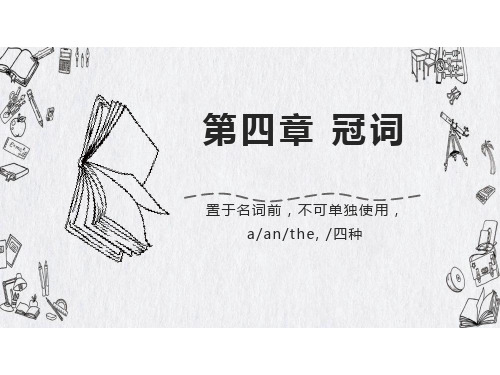
不定冠词a/an 不定冠词有两个,即a和an,只能用在单数可数名词之前,复数名词或不可数
名词表示泛指时不加冠词。
(3)第一次提到某人或某事物时。
eg:There is a car over there.
Is that yours?
eg:There is a picture on the wall.
墙上有一幅图画。
不定冠词a/an 不定冠词有两个,即a和an,只能用在单数可数名词之前,复数名词或不可数
名词表示泛指时不加冠词。
(2)泛指某一类人或事物。
eg:Even a child can answer this question. 就是小孩子也能回答这个问题。
the United Nations 联合国
定冠词the
定冠词就是the,用来表示“特指”
(8)用于复数姓氏之前,表示“一家人”或“夫妇” 。
eg:The Whites like the classic music.
怀特一家喜欢古典音乐。
the Wangs
王家一家人
定冠词the
定冠词就是the,用来表示“特指”
(6)用在事物的度量单位前,如时间、速度、价 格等,表示“每一个”。
eg:We often go to school two times a day.
我们常常一天两次去学校。
I went to the library once a week at least.
我一星期至少去一次图书馆。
不定冠词a/an
morning.
今天上午我们有物理课和历史课。
He likes plaБайду номын сангаасing football.
语言学概论第四章语法.
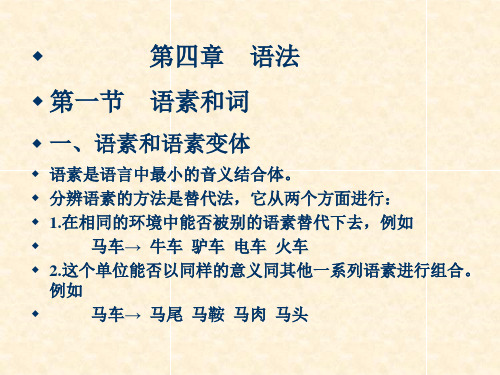
同一语素内略有差异的单位叫做语素变体 语素变体可分为语音变体和语义变体。 @语音变体: “一”的变体: (1)[i55][i51][i35](条件变体) (2)[i55]/[iau55] (自由变体:电话2115787、房号218) (条件变体:电报[iau] 、买菜[i]) 英语表示名词复数的s有下列变体: 1.[s]用在收音为清辅音的音节之后,如books[bukhs] 2 . [z] 用 在 收 音 为 浊 辅 音 和 元 音 的 音 节 之 后 , 如 dogs[d• gz];days[deiz]。 3 . [iz] 用 在 收 音 为 舌 叶 音 的 音 节 之 后 , 如 benches[bentSiz]
语素的分类: 根据语素在词中的作用,可以分为词根语 素和附加语素两种。 词的词汇意义的主要表达者称为词根语素, 是词的核心部分; 粘附于词根之上,表示附加意义的语素称 为附加语素,其中只表示语法意义的附加 语素又叫词尾,其他叫词缀。 例如在英语“teachers”这个词中,“teach” 是词根,“-er”是词缀,“-s”是词尾。
词缀又根据在词中的位置,分为前缀、后 缀和中缀。 根据语素能否独立成词可以分为成词语素 和不成词语素。 成词语素是能够独立成词,又能和别的语 素组合成词的语素。 汉语:人 天 地 大 小 学 不成词语素是不能独立成词,只能与别的 语素组合成词的语素。 汉和词的构成 词的结构类型指的是构成词的语素之间的种种 关系形成的类型,可以 分为单纯词和合成词两 大类型。 单纯词是由一个语素构成的词。 汉语 “人”、“蜻蜓”、“沙发” 英语 “man” 、“do”、 “red” 合成词是由两个或两个以上语素构成的词,其 中构成语素都是词根的叫做复合词,构成语素 有词根也有词缀的叫派生词。
语言学概论 第四章

3、根据语法形式的共同特点把它们归并为几个基 本类型,这种语法形式的类就叫做“语法手段”。
词形变化
词法手段 语法手段 句法手段 词的轻重音
词的重叠
虚词
语类选择
语序 语调
4. 词法手段
(1)词形变化是指通过词的形态变化产生一定语 法意义的形式就是词形变化,包括:
附加:在词的前面、中间或后头加上词缀。 books 屈折:词的内部发生语音的交替变化。(汉语无) foot—feet send—sent 异根:换用不同的词根构成相同意义的词。 go— went (汉语无) 零形式:相对与词形变化的词的原形形式。 fish
3.谓词性范畴的表现形式:主要表示的意义范畴有时、 体、态和人称。 (1)时范畴即表示动词所反映的动作发生的时间和说话的 时间的关系的一组特征,一般可分为现在时、过去时和 将来时。 (2)体范畴即表示动词所反映的动作行为进行的状况的一 组特征,常见的有进行体、完成体和未完成体。 (3)态范畴即表示动词与主语名词之间的施受关系的一组 特征,主要分主动态和被动态两种。 (4)人称范畴即表示动词与主语名词一致关系的一组特征。 如英语中第三人称单数。
A、表复数或“逐个”的意思。如马来语名词重叠 表复数,汉语中名词或量词表重叠表“逐个”的 意思。如“人/人人”“个/个个”等。 B、表短时和尝试的意思。如汉语中的“想/想 想”“体验/体验体验”等。 C、表程度增加的意思。如“雪白雪白”等。
5、句法手段
(1)虚词是通过使用虚词来表示一定语法意义的形式。 语言中凡是没有词汇意义只有语法意义的词就是虚 词。虚词可分为辅助词和功能词两小类。
2、在这三种分类标准中,功能分布的标准最具普 遍性,而且是反映词类聚合关系本质的特征,是 词类的本质属性。因为仅从词的意义标准来划分 词类,有些词汇意义相同或相近的词却分属不同 的词类的现象就不能得到解释。而以形态标准来 区分词类,对那些形态较发达的语言比较可行, 但在那些缺少形态或根本没有形态变化的语言面 前又无能为力了。因此分布标准最可行,只是在 具体区别词类时,形态和意义也可以作为参考。
初中英语语法(鲁教版)教材语法目录

初中英语语法(鲁教版)教材语法目录本文档将列出初中英语语法(鲁教版)教材的语法目录,以便帮助学生更好地研究和掌握英语语法知识。
第一章:名词- 1.1 名词的定义和基本用法- 1.2 单数和复数形式- 1.3 不可数名词- 1.4 名词所有格- 1.5 特殊名词的复数形式第二章:代词- 2.1 人称代词- 2.2 物主代词- 2.3 反身代词- 2.4 指示代词- 2.5 疑问代词- 2.6 不定代词第三章:冠词- 3.1 定冠词(a/an)- 3.2 不定冠词(the)第四章:形容词- 4.1 形容词的定义和基本用法- 4.2 形容词的比较级和最高级- 4.3 形容词的位置第五章:副词- 5.1 副词的定义和基本用法- 5.2 副词的比较级和最高级- 5.3 副词的位置第六章:动词- 6.1 动词的定义和基本用法- 6.2 三单形式- 6.3 一般现在时- 6.4 一般过去时- 6.5 一般将来时- 6.6 现在进行时- 6.7 过去进行时- 6.8 将来进行时- 6.9 现在完成时- 6.10 过去完成时- 6.11 将来完成时- 6.12 现在完成进行时- 6.13 过去完成进行时- 6.14 时态的混合使用第七章:介词- 7.1 介词的定义和基本用法- 7.2 常见介词及其用法- 7.3 介词短语的用法第八章:连词- 8.1 连词的定义和基本用法- 8.2 并列连词- 8.3 从属连词- 8.4 连词的位置第九章:句子- 9.1 句子的分类- 9.2 简单句- 9.3 复合句- 9.4 疑问句- 9.5 否定句- 9.6 感叹句以上是初中英语语法(鲁教版)教材的语法目录,希望对学生研究和掌握英语语法知识有所帮助。
人教部编版五年级下册英语教案 Unit 4 When is the art show?
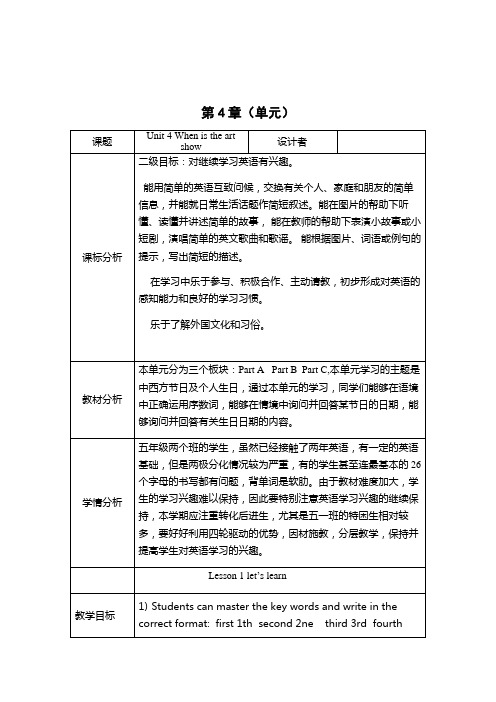
第4章(单元)五、总结升华(新授):1、教师在PPT上呈现序数词单词,并重点讲解April 1st : first 1st缩写:1st 基数词:one短语: the first floor一楼;第一层April 2nd second /'sekənd/ 第二(的)缩写:2nd 基数词:two一词多义:second n.秒April 3rd third /θɜːd/ num. 第三(的)缩写:3rd 基数词:three短语:the third month第三个月April 4 rd fourth /fɔːθ/ num. 第四(的)短语: the fourth season第四个季节April 5th fifth /fɪfθ/ num. 第五(的)2、进行操练(分组合作,讨论质疑)4月1日 April 1st ( April the first )4月2日 April 2nd ( April the second)...3、讲解本课重点句型,并进行操练。
教师在PPT上展示句型和替换单词,讲解— When is the maths test?—___________________.六.拓展six seven eight nine tensixth seventh eighth ninth tenth七、总结反刍学科班长带领大家总结本科的学习内容,教师补充。
八、当堂检测说出并写出:8月6号 3月4号 1月5号分组合作,讨论解疑培养学生的认知策略大面积互动展示点评此环节为课后作业环节,包括复习和预习两一、根据图片用When is...? It's...编对话。
(1)—____________________________—____________________________(2)—____________________________—____________________________八、自我完善,训练提升HomeworkReview the knowledge points of last lesson,and recite let’s talk板书设计Unit 4 When is the art showSpecial daysWhen is the school art show?It’ on May 1st.When is the reading festival?It’s on 5th.此环节为课后作业环节,包括复习和预习两部分,预习作为“读书自学,自主探究”与下一节课的“完成学案二次探究”形成闭环。
大学实用翻译教程(英汉双向)第四章 词语翻译技巧

二、 汉译英
1、动词转为名词 这本书反映了20世纪90年代的中国社会状况。
The book is a reflection of the Chinese society of the 1990s. 据我们了解,贵公司经营中国产品已有多年 历史。
We learn that you have been dealers of Chinese products for many years. 我公司决定按照来函说明的条款,试订下列 货物。
(2)省略物主代词
We are doing our physical experiments. 我们正在做物理实验。
Plants obtain their energy from sunlight.
植物是从太阳那里获得能量的。
The diameter and the length of the wire are not the only factors to influence its resistance. 导线的直径和长度不是影响电阻的仅 有因素。
3、省略连词
When short waves are sent out and meet an obstacle, they are reflected. 短波发送出去,遇到障碍就反射回来。
Go and see if they are still in the laboratory. 请去看看他们是否还在实验室里。
第四章
词语翻译技巧
第一节 词类的转换
英语属印欧语系,汉语属汉藏语系。 英汉两种语言在词汇和语法结构方面 有许多不同,因此,在多数情况下英 汉互译的时候很难将两种语言的词汇 或结构一一对应。为了使译文符合译 出语的习惯,翻译时不必拘泥于原文 的表层结构,可以在忠实原文意义的 前提下,将原文中某些词的词类或成 分转换为译出语的其他词类或成分。
高中英语语法知识点总结

高中语法知识点总结第一章冠词高考对冠词的考查集中在基本用法上,主要既反映在对泛指、特指及固定短语冠词的考查。
抽象名词、物质名词的具体化依然是高考的重点、难点。
一、不定冠词不定冠词a,an与one同源,表示微弱的“一”的概念,但并不强调数目,用来表示不确定的人或事物。
A用在辅音前,而不是辅音字母前;an用在元音前,而不是元音字母前。
a university in Asia1.表示同类中的“任何一个”A cat has nine lives.2.表示泛指的某人、某物I know a John Lennon,but not the famous one.3.表示数量的“一”He has a daughter.4. 表示单位数量的”每一”I earn 10 dollars an hour.5.表示相同的”The two birds are of a color.6. 用于集体名词前He grows up in a large family.7. 在某种情况下可用于抽象名词和物质名词前China has a long history.二、定冠词的用法1.表示特定的人或物2.表示地球、宇宙中独一无二的事物主要指各种天体及世界上比较有影响的物体。
The sun,the moon,the earth3.表示地点、方向、时间、方式等at the corner 在拐角处1)在表示季节的名词前常不用冠词。
In spring 在春天2) 具体某年的某个季节,需用冠词。
In the summer of the year20083)用于序数词或形容词的最高级前the first the second4)用于形容词前使其名词化the rich the poor5)用于复数姓氏前,表示“夫妇”或全家The Smiths6)用于乐器名词前Play the piano7)用于by+the+计量单位名词By the pound1. 用于复数名词前复数名词泛指某类人或物时,其前通常用零冠词。
小学英语语法总结定冠词的用法

Excuse me!Are you Teacher Wang?对不起,请问你是王老师吗?
【What's ...的用法】:
这个句型用于询问某人叫什么或者某个东西是什么,例如:
What's this?It's a book.
8)用在某些由普通名词构成的国家名称、机关团体、阶级、等专有名词前:
the People's Republic of China 中华人民共和国
the United States 美国
9)用在表示乐器的名词之前: She plays the piano. 她会弹钢琴。
10) 用在姓氏的复数名词之前,表示一家人:
5)用在序数词和形容词最高级,及形容词only, very, same等前面:
Where do you live? I live on the second floor. 你住在哪?我住在二层。
That's the very thing I've been looking for. 那正是我要找的东西。
I am a teacher.我是教师。
You are a worker.你是一个工人。
You are students.你们是学生。
She is Miss Gao.她是高小姐。
This book is mine.这本书是我的。
【与熟人打招呼】:
英美人一天中见面都要打招呼,根据一天中不同的时间选用不同的说法,早上和上午时说Good morning,下午时说,Good afternoon,晚上见面时则要说Good evening。对方也用相同的问候语来回答。例如:
- 1、下载文档前请自行甄别文档内容的完整性,平台不提供额外的编辑、内容补充、找答案等附加服务。
- 2、"仅部分预览"的文档,不可在线预览部分如存在完整性等问题,可反馈申请退款(可完整预览的文档不适用该条件!)。
- 3、如文档侵犯您的权益,请联系客服反馈,我们会尽快为您处理(人工客服工作时间:9:00-18:30)。
第四章冠词I. 填入a 或an:1. ______ ear2. ______ hour3. ______ example4. ______ hotel5. ______ item6. ______ video7. ______ flyer 8. ______ uncle 9. ______ airport10. ______ useful thing 11. ______ copy 12. ______ university13. ______ aunt 14. ______ S 15. ______ American girl16. ______ D 17. ______ Englishman 18. ______ 100-word report 19. ______ 8-year-old boy 20. ______ award 21. ______ cartoon22. ______ event 23. ______ locker 24. ______ liquid25. ______ UFO 26. ______ inn 27. ______ electric light28. ______ egg 29. ______ X 30. ______ halfII. 在下列各句中填入必要的冠词:1. He used to be ______ teacher, but now he has become ______ engineer.2. We shall be late if we don't take ______ taxi.3. Some modern planes can fly at over ______ thousand miles ______ hour.4. For ______ breakfast we usually have ______ bread and ______ eggs.5. We are ______ neighbours. What ______ coincidence!6. Let's give ______ gold coin to ______ policeman over there.7. At ______ airport you can always see ______ taxis waiting in ______ line.8. -- What do you think of ______ dance by ______ Class 3?-- ______ dance is good, but ______ music is too loud.9. My office is on ______ third floor. How about yours?10. -- What about this shirt?-- ______ colour is right, but ______ size isn't.11. ______ robots do much work for ______ people.12. ______ life at ______ school is both busy and interesting.13. -- What's ______ score?-- Two to three.14. -- May I speak to Mary?-- Just ______ minute.15. ______ rivers are very important in many ways.16. ______ Amazon is one of ______ longest rivers in ______ world.17. ______ match is between ______ Bears and ______ Tigers. It will be exciting.18. ______ factories in ______ city are not allowed to let out ______ dirty smoke into ______ air.19. He has been to ______ Athens, ______ capital of ______ Greece.20. All parents want their children to go to ______ college.21. ______ December 25th is ______ Christmas Day.22. ______ Great Wall and ______ Summer Palace are famous all over ______ world.23. There are many shops and restaurants on ______ Fifth Street.24. I prefer ______ science fiction because it is more interesting than ______ children's stories.25. On ______ Christmas Eve ______ Father Christmas usually bring ______ children ______nice toys and foods.26. ______ top of ______ mountain is covered with ______ snow all ______ year round.27. ______ sun rises in ______ east and sets in ______ west.28. ______ performance by ______ Russian artists will take place on ______ fourteenth of______ April.29. ______ books on ______ able are mine.30. ______ boys, come to ______ dinner with me.31. ______ student over there is ______ best in ______ class at ______ English.32. My brother likes playing ______ tennis and I like playing ______ piano.33. Perhaps this is ______ shortest way to ______ Science Museum.34. I have two children: ______ boy and ______ girl. ______ boy's name is John, and ______girl's name is Mary.35. Excuse me, is this ______ train for ______ London?36. ______ flowers in ______ garden smell nice.37. Bob and I sit at ______ same desk.38. When I got there, ______ last bus had gone, so I had to go home on ______ foot.39. He is going to London by ______ air, but I'd prefer to go there on ______ train.40. ______ spring has come, and ______ leaves are turning green again.41. After ______ lunch we usually have half ______ hour's rest.42. Nobody wanted to be ______ first to speak, so the teacher asked, "Who'll break ______ice?"43. ______ morning is ______ best time for ______ work.44. When I learned my aunt was in ______ hospital, I went to see her.45. Please call in fifteen minutes. He's busy at ______ moment.46. Ming Ming was chosen to go to ______ South Pole as ______ Young Pioneer.47. Some shops are still open even late at ______ night.48. ______ East China Sea is part of ______ Pacific.49. Where is ______ letter from ______ Jane?50. I'd like to send ______ parcel to ______ New Zealand by ______ ordinary mail.III. 选择填空1. -- May I open ______ bag, sir.'?-- Of course, but it's full of ______ dirty clothes.A. the, /B. the, theC. /, /D. a, /2. ______ family often eat ______ supper together.A. /, /B. The, theC. The, /D. A, a3. ______ mice are often found in ______ dirty houses.A. The, theB. The, /C. /, any ofD. /, /4. My father never lets us go to ______ movies ourselves.A. /B. aC. theD. some of5. -- Have you ever been to ______ Netherlands?-- No, but I have been to ______ France.A. the, theB. /, /C. /, theD. the, /6. As there is no bridge over the river, people have to cross it ______.A. in boatB. on the boatC. by a boatD. by boat7. ______ girl at ______ checkout was too busy to answer my question.A. The, theB. A, theC. The, aD. A, a8. -- Hello, is Betty there?-- I'm sorry, you've got ______ wrong number.A. aB. theC. /D. some9. Peter always came home from ______ school very late, so his mother went to ______ school to find out.A. /, /B. the, theC. the, /D. /, the10. Sam sold ______ pictures every day, and all ______ pictures in his shop were cheap.A. /, theB. /, /C. the, /D. the, the11. ______ enjoy watching ______ Mickey Mouse on TV.A. Most children, /B. The most children, theC. Most children, theD. Most of children, /12. Many rivers in our country run from ______ west to ______ east.A. the, theB. /, /C. the, /D. /, the13. -- What's ______ postage for ______ parcel, sir.'?-- I'll weigh it first.A. a, theB. a, aC. the, theD. the, a14. ______ dictionary is ______ useful book.A. A, aB. The, anC. The, theD. A, the15. He collects Chinese paintings for ______ hobbies, but not for ______ money.A. /, /B. the, theC. the, /D. /, the16. You can't keep this book for more than two weeks. This is ______ only copy in our library.A. theB. /C. anD. a17. -- Don't make any noise, ______ children. Your father is at ______ work.-- OK.A. /, theB. /, /C. the, /D. the, the18. It's very warm today. ______ warm day is almost like ______ early summer.A. A, theB. The, /C. /, theD. A, a19. He is a student of ______ history, and he studies ______ history of Canada.A. the, theB. the, /C. /, /D. /, the20. Which language do you speak better, ______ English or ______ Japanese?A. the, theB. the, / C, /, the D. /, /21. I prefer going by ______ sea to going in ______ train.A. /, /B. /, theC. /, aD. the, a22. ______ Oxford Street is one of ______ busiest streets in London.A. /, /B. /, theC. The, theD. The, /23. He is usually at ______ home on ______ weekends.A. /, /B. /, theC. the, /D. the, the24. One of Harry's feet was bigger than ______ other, so he could never find ______ shoes for his feet.A. the, theB. the, /C. /, /D. /, the25. It's ______ very long way from our world to ______ moon.A. a, theB. the, aC. the, theD. a, /26. We have ______ computer room in our school, and we are going to build ______second one.A. a, theB. the, theC. a, aD. the, a27. He telephoned his wife to tell her ______ name and address of ______ hotel.A. the, aB. /, /C. the, theD. /, the28. When it began to rain, we ran to find ______ place to hide from ______ rain.A. a, theB. the, aC. a, /D. the, /29. He found he couldn't sleep at ______ night, so he kept on falling asleep during ______ day.A. /, /B. the, /C. the, aD. /, the30. It's pleasant to travel along ______ Nile on ______ ship.A. /, theB. the, /C. the, aD. /, a31. -- Here are many kinds of pens. Have you found ______ one that you want?-- Yes.A. theB. aC. /D. some32. -- Have you got any cheaper walkmans?-- Yes ______ walkman beside ______ black one are cheaper.A. The, /B. The, theC. /, aD. /, /33. -- What about brown ones?-- Well, they are just ______ size I want. How much do they cost?A. aB. /C. theD. any34. She enjoys ______ school, but some of ______ work is too easy for her to feel interested.A. /, /B. the, /C. /, theD. the, the35. Some people read ______ newspapers as ______ first thing to do in the morning.A. the, theB. /, aC. /, theD. the, /36. ______ Browns go to ______ church every Sunday morning.A. The, /B. /, /C. /, aD. A, the37. Be sure to close ______ windows before you leave ______ room.A. /, /B. /, theC. the, theD. the, a38. Bruce plays ______ video games as soon as he's got free time during ______ day.A. /, aB. the, theC. the, aD. /, the39. ______ Yellow River is one of ______ famous rivers in the world.A. The, theB. /, theC. The, /D. /, /40. He will leave for ______ America after ______ Christmas.A. /, /B. the, theC. /, theD. the, /41. ______ Chinese is one of ______ most beautiful languages in the world.A. The, theB. /, theC. the, /D. /, /42. John noticed ______ books on ______ sale and bought a few of them.A. /, /B. the, theC. the, aD. the, /43. The lady said sorry to me as she spilled some of ______ coffee on ______ floor.A. the, theB. /, aC. the, aD./, /44. Usually ______ children begin to take an interest in reading around ______ age of five.A. /, theB. the, theC. /, anD. the, an45. ______ Maxim's in ______ Paris is a very famous restaurant in the world.A. The, theB. /, /C. /, theD. A, /46. ______ policemen in England, unlike those in the United States, do not carry ______ guns.A. The, theB. /, /C. /, theD. The, /47. ______ mathematics is ______ difficult course for people to understand.A. The, aB. /, theC. /, aD. /, /48. Matha, aunt is coming for ______ visit in ______ April.A. the, theB. a, /C. a, /D. the, /49. The basket of ______ apples was sent as ______ Christmas present.A. the, theB. /, theC. /, aD. /, /50. ______ Professor Lee hasn't come back yet; he's still in ______ hospital.A. /, /B. The, aC. The, /D. A, a。
